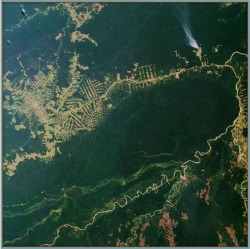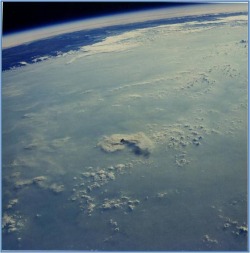DEFORESTATION
DEFORESTATION
Deforestation – defined as the act of clearing land of forests or trees – is both a natural and human-induced landscape change. Deforestation for farmland in the rainforests of South America has potentially devastating global affects. South America contains 37 percent of the world’s tropical rainforests and this number is declining (Benhin). At its most prosperous time the Amazon forest covered approximately six million square kilometres; trees that had developed over 55 million years (Butler 1).Rainforest removal is a typical cause and effect relationship, with the reasons involving human priorities, and the effects concerning biodiversity and the entire world. Deforestation for farmland represents a growing trend to serve the ever-increasing world population: meeting the demand for subsistence with new agriculture land. However, this ideology and action have unforeseen results in the ultimate depletion of agriculturally sustainable land. Deforestation has global consequences: affecting tropical rainforest ecosystems and in effect, the balance of the Earth. South America represents a hot-spot for tree removal in the quest to expand agricultural land and create suitable farming terrain wherever possible. Increasingly, once a natural and human-induced landscape alteration, deforestation is a result of human endeavours. Within this report, deforestation is the result of removing founding forests and replacing with foreign farmland.
Deforestation by agricultural expansion in South America affects the globe. Rainforest removal, through destructive methods degrades the land and increases carbon emissions into the atmosphere. Effects of human actions are not being adequately considered: with biodiversity disappearing and unsustainable farming being practiced for economic gain. The scale is global, influencing citizens to corporations to governments, there is a need to prevent future forest loss and reduce prior impact. This will not happen overnight, not enough emphasis is being placed on the Earth’s landscape, as people instead are looking towards how to better the economy. Environment takes a backseat to issues of the short-term, and the world as a factory, is destroying the world as a home, for every living creature. Resource depletion is occurring at rates never seen before and computer simulation models are reaching to keep up. Estimates vary as to the full effects, but known, is that all actions concerning the removal of something as basic as a tree, have prolonged influences. South America is losing forests at substantial rates that can now be measured annually. Tropical deforestation will continue, though slowing tree removal would have great results.
World population growth is fueling the idea that agriculture needs must be provided and exceeded at any cost. This ideology leaves a scorched earth for future generations; barren and exposed to the elements. Deforestation has too many negative consequences to make it sustainable. Its continuation should be in a way that lessens the impact on the planet and surrounding atmosphere. Potential of the rainforests will not be realized so long as humans continue to replace founding forests with foreign farmland.
Rainforest Removal
The rainforests of South America are homes to great amounts of biodiversity: from humans and animals and trees, to the microorganisms found in the soil. Removing any component of this interrelation destroys the balance of this tropical ecosystem and results in prolonged damage to all components. Especially since the forests, which represent economic gain to governments, but habitats and nourishment to biodiversity, have applications in all components of earth: soil, water, air, and living things. Rainforest removal devastates on so many scales.
Forest for Farmland
Deforestation for farmland reduces land quality and production output over time. Alternatives are available, though not often considered by the famers primarily deforesting as a means of survival. Landscape change affects the biodiversity of South America’s rainforest ecosystems, and though human subsistence needs are met, unknown effects are guaranteed to impact larger areas than the ones slashed and burned. Converting land by removing vegetation degrades soil quality, nutrients and moisture content of the area: factors necessary for sustainable agriculture. 37 percent of the world’s 2 billion hectares of tropical forests are contained in South America, and more and more areas are being reduced to farmland and pasture (Benhin). Deforestation is on the rise; its full effects on its agriculture replacement are unknown but anticipated. Alternatives are always available, though not always realized, and with technological advancements to food production, better methods towards the use of land become available. Balance is required: between forest and farmland, human populations and biodiversity, and the Earth’s population needs versus the Earth’s geographical requirements.
Global Effects
The future of the tropical rainforests in South America and around the world is uncertain. Their global effects are now being noticed, and with aid and research, human impacts may be reversible or at the very least decreasing. Deforestation is a pressing issue that affects the entire planet: its climate, biodiversity and economy. An equilibrium must be achieved, as disasters are imminent. Such environmental and social influences can only promote change.



